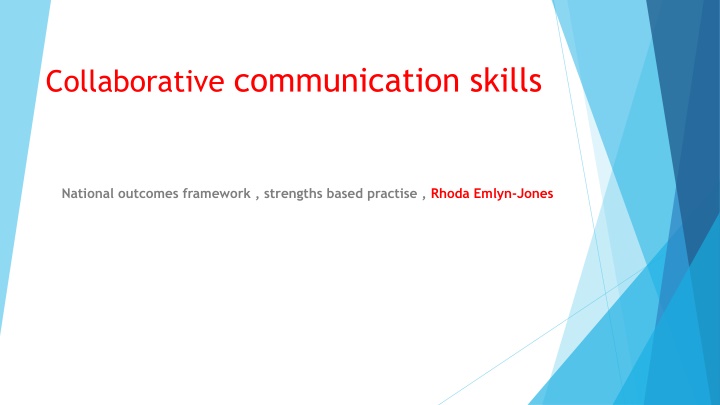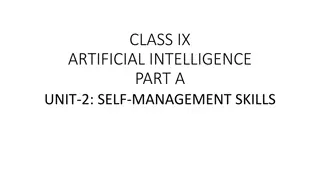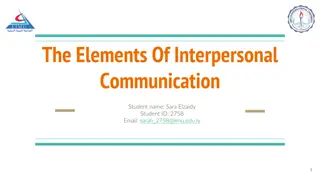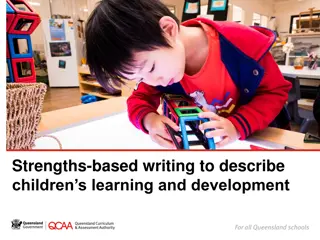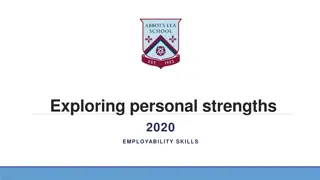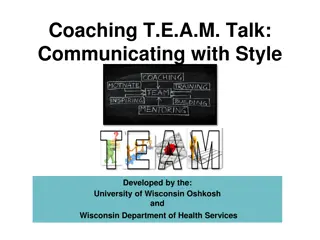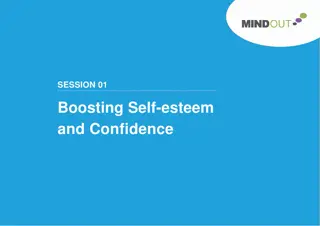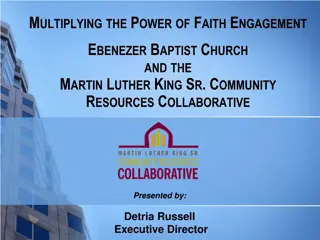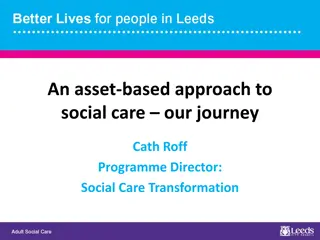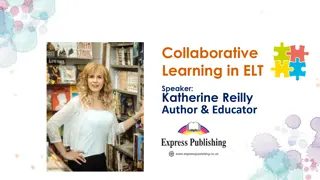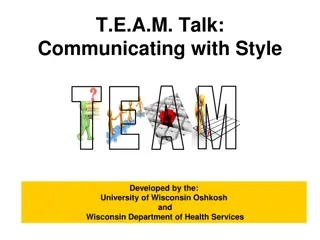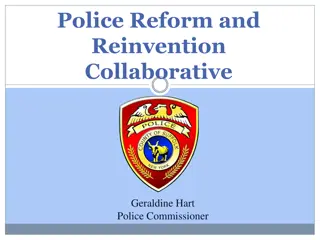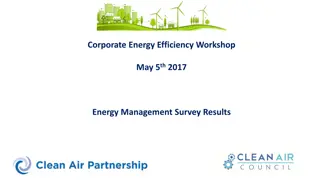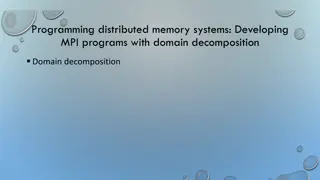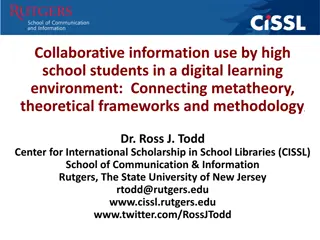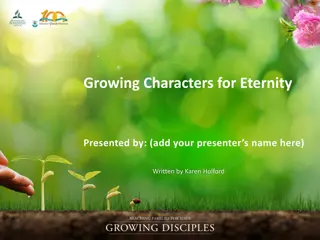Developing Collaborative Communication Skills for Strengths-Based Practice
Explore the intersection of collaborative communication skills, strengths-based practice, and the National Outcomes Framework. Emphasizing outcome-focused public services, this approach centers on understanding individual circumstances, supporting sustainable outcomes, and maximizing autonomy. Focusing on strengths and resources rather than deficits, the context highlights the importance of person-centered care and involvement of service users in identifying desired outcomes. Embrace thoughtful conversations, empowerment, and holistic responses to better support individuals and families.
Download Presentation

Please find below an Image/Link to download the presentation.
The content on the website is provided AS IS for your information and personal use only. It may not be sold, licensed, or shared on other websites without obtaining consent from the author.If you encounter any issues during the download, it is possible that the publisher has removed the file from their server.
You are allowed to download the files provided on this website for personal or commercial use, subject to the condition that they are used lawfully. All files are the property of their respective owners.
The content on the website is provided AS IS for your information and personal use only. It may not be sold, licensed, or shared on other websites without obtaining consent from the author.
E N D
Presentation Transcript
Collaborative communication skills National outcomes framework , strengths based practise , Rhoda Emlyn-Jones
Strengths Based Practice Outcome focused public services Collaborative communication Exploring personal outcomes Supporting a skilled workforce
Guiding principle: We start with outcomes for children and then work backwards to develop the key policies and procedures that will support best practise
National Outcomes Framework: Key element of the transformational change To: A Shift from: A series of empowering conversations designed to understand each unique set of circumstances and a system that supports that approach e.g. relevant paperwork, IT systems and management decision making processes Heavily process driven interactions that lead staff to a particular style of conversation in order to answer the questions the organisation asks of them Responding to the needs of the system at the expense of spending more time listening and understanding the person and family Skilled, thoughtful conversations that focus on resolving the service user dilemmas, collaborating in establishing sustainable outcomes, maximising autonomy, independence and strengths
The context Notice people for the problems they face not the problems they cause Notice the resources and strengths they have to overcome obstacles Explore their strengths their values their hopes and aspirations Be along side In a context where the emphasis is on risks Multiple assessments- lengthy waiting lists Evidencing deficits in order to reaching thresholds and criteria for limited services.
Context Person centred care is a core concept for us all: The Social Services and Wellbeing (Wales) Act Requires that we: Ascertain and have regard to the individuals views, wishes and feelings Identify the outcomes that the person wishes to achieve What matters to you
Your interest in today What particularly interests you? What are the issues facing you and your service users? Brief introductions and discussions, share your thoughts
So our response needs to be holistic Move away from traditional problem focussed, service and task focussed plans to holistic approaches that focus on the person and their networks/family, understanding the unique identity of each person and situation. To enable them to live as fulfilled a life as possible and achieve a sense of wellbeing.
The changes people face are challenging How we think about something effects what we do!!!
Imagine A change you are thinking about making Work/Life balance Eating Exercise Parenting Supporting elderly parents Make a commitment!!!! 12
A bad start! How do you feel about the issue now? How do you feel about me?
Managing your life How important is to me to make/maintain this change? 0 -----------------------------------------10 not at all very How confident am I that I could make/maintain this change if I decided to? 0 -----------------------------------------10 not at all very
Changing things is never easy Our starting point Understanding the challenges people face
Empathy and Understanding Step 1: Step 4: Good things about staying the same Good things about making the change Step 2: Step 3: Not so good things about staying the same Not so good things about making the change
The most important elements of good communication? Empathy Warmth Clarity about concerns Recognition of strengths
Skilled and Sensitive Conversations The only way you can Ascertain the most meaningful things for people is through sensitive conversations. Staffs understanding of persons needs What's important to them And have regard to: Listen to and value the insights from service user, family and worker Regularly reflect on change? Respect the insights and act upon them More emphasis on what worker and family can achieve when the work together Less exploration of what people cant do, more emphasis on what they want to do
Relationship based practise How we think about something affects what we do about something Our approach to the issue affects the outcome We are engaged in a dynamic process , in any encounter between a worker and a family member there should always be two people learning ! The result needs to be self empowering for the family The goal to gain insight as well as information.
Focussing our skills We notice people for the problems they face not just the problems they cause We notice peoples abilities to alter their course We focus on their hopes and aspirations We notice the ability people have to offset their own risk and concerns We notice the strengths of families/groups/units and support what's important to them building on their resilience
Empathy Client defence and Disclosure
Investment in skilled listening from the outset Builds trust Increases disclosure Reduces defensive behaviour Decreases hidden harm
Conversational Traps Expert trap Yes-but trap Power trap Blaming trap Problem solving trap Labelling trap Question and answer trap Confrontation trap
The essence Collaboration Listening and evoking Respecting autonomy
Principles of effective communication Listen and Express Empathy Explore concerns and aspirations Expect natural defensiveness Support the persons sense of their abilities Avoid Arguments and confrontation 01/09/20 24
Effective practitioners Do Make a commitment Stay calm and purposeful Build hope Stay focussed on the most difficult issues Acknowledge the challenge Explore others hopes and aspirations Respect others skills, knowledge and expertise Try to avoid Rescuing, advising, telling or doing to rather than with
Core Skills Ask Open minded questions Affirm: notice and reflect strengths and challenges Listen Reflectively Summarise
Reflective Listening A reflection is a statement not a question. Reflections help to engage the client in a reflective space. They help to engage the client in connecting with their own insights , understanding themselves better. They can express content, feeling and meaning
The power of reflection If you are reflecting you are focussing on their world, their thoughts, their dilemmas. As opposed to: asking questions designed by the system which may or may not be relevant or meaningful or making suggestions or offering advice from our perspectives. It is a vehicle for your intuitive understanding.
Your professional intuition Hard thinking Trying to connect At an emotional level At a meanings level Carry that thought in a statement The recipient connects with their own feelings and meanings at a deeper more empowering level
The conversation matters my mum died suddenly last year, my dad has been drinking ever since, I want to drink and forget too but I need to take care of my sisters 14 year old girl How to connect with her?
Demo In pairs Discuss What you heard? What you think s/he means? What you think s/he feels? What her values and drivers are? What its like to be her/him? Paraphrase in your own words and offer a brief statement on any of the above This is your professional intuition at work, deepen as conversation progresses
Asking Questions Open, Thoughtful exploratory Strategic Key questions
Summarising A focus on key issues What are the strengths/skills and motivators you have noticed What actions have they decided to take Empowering summaries
Skills Practice In threes with people you know less well Speaker : discuss something from your own lives Listener: listen to meanings & feelings paraphrase reflect, notice strengths & affirm, End with a summary. Try not to ask questions or provide solutions Observer: keep time. Watch the interaction Allow 5 minutes for practice and 5 minutes for debrief. Swap over so that everyone has a go in each role. Observers give feedback start with the Speaker, then the Listener, then the Observer
Notice & reflect on strengths Notice the persons strengths and resources Rooted in observations and evidence Not praising but: Offering Statements of appreciation and understanding Builds self efficacy Strengthens and builds your working relationship
Noticing strengths Exercise In pairs, discuss a challenging case that you worked and ultimately went well Discuss with partner Listen for the speakers/workers, character, strengths, principles and values Summarise and feedback affirmations rooted in evidence and observations
Feedback Something that struck me from today
Welcome back Day 2
Key questions at referral Early conversations Cross professional agreement, at Referral, MDT s, Core groups etc. Outcome conversations, exploring endings and strengths at the beginning makes it possible for people to succeed Example key questions:- What are the priority needs for this family/family member? What specifically concerns you? What have you noticed when things are going well? What do you hope for in terms of behavioural change ? Short term? Medium term? Long term? What would the person/family be doing differently in 3 months time if things were improved ? If you were less concerned? What would you specifically want from us? How shall we keep in touch as things progress?
Engaging familes Early strategies to engage If a professional was coming into your life , invited or otherwise, what would you want from them? What would they be doing that would make you think ? we have hope here, we will invite them back.
First contact Q Tell me a bit about what's been happening? Reflection examples you have a lot on your plate your under a lot of stress Q what concerns you most? You can manage this but this feels too difficult Q On a day when things are not so bad what do you notice happening There are people around who care and help Q If things were a little bit better what would that look like You have a clear picture of how to improve things
The Skills Open minded questions Affirmation statements, notice strengths Listen Reflectively Summarise in an empowering way
Skilled staff work with the feelings that lie behind the behaviour behaviour feelings Refuse to cooperate Avoid appointments Minimise the problems Make things up Argue Passive agreement Shame Guilt Fear of judgement Fear of consequences Fear of Vulnerability Panic
Lowering defences in Practice What do see and experience in your practice? Behaviours Feelings behind the behaviours Top tips for lowering defences and engaging?
Strategies for lowering defences Resist hitting it head on Try not to take it personally Acknowledge the feelings Empathise, Accept, Reflect and Explore Shift to strengths based conversation Emphasise personal choice and control Avoid argumentation
Using strategies. Sets of questions designed for a specific purpose Questions are skills for direction Reflections and affirmations are skills for depth When we use a set of questions we need to underpin them with reflections and affirmations Be intentional and purposeful
